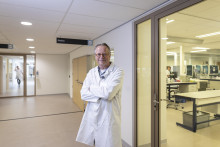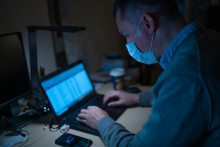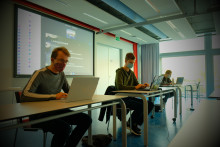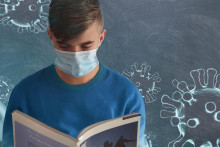‘I started to focus on COVID-19 research as soon as the corona crisis started,’ says Schasfoort, researcher at the Medical Cell BioPhysics group at the University of Twente. ‘Once the coronavirus emerged, I knew that we needed to not only measure the presence of the virus, but also tests that measure the presence of antibodies. By measuring antibodies the medical staff can get a better idea of the stage of the disease.’
From campus to hospital
As it happens, Schasfoort has spent his entire career on research of antibodies. He has developed a special sensor used for testing their presence in the body. In March, he quickly decided to apply this sensor to COVID-19. ‘I had the technology and I knew how to use it, so I knew it had to be me. If I couldn’t do it, nobody could,’ he says.
The scientist was able to retrieve all the needed equipment from the lab at the UT right before the lockdown and set it up at Medlon lab at MST. ‘I was happy to receive support from the UT. They allowed me to get the equipment and to stop all my other activities, to focus on this full-time. I’m also working together with the NanoBio research group at Saxion, which supported me in acquiring the necessary chemicals and antibodies. Thanks to this, I was able to work during the lockdown. I have been in the hospital every day since, working with serum from 96 patients suffering from COVID-19.’

Antibodies
To fully understand what the scientist has developed, a brief explanation of antibodies is needed. ‘In this case we are focusing on three types of antibodies,’ explains the expert. ‘There is IgA: the first defense of the body. IgM: molecule that appears once the disease progresses. Then there is IgG, which everyone is talking about now. Those are the soldiers that are permanently present in your body, also after the disease. IgG basically gives you immunity to the disease. It is important to measure all of these types.’ Schasfoort’s test does precisely that.
By knowing which antibodies are present, the medical staff may immediately determine at what stage of the disease the patient is in – and also if the patient has had the disease in the past, even if he didn’t show (severe) symptoms. ‘There is a big interest in this sort of test,’ says Schasfoort. ‘Everyone wants to know if they had coronavirus or not, because perhaps they only had mild symptoms.’
Near the finish line
Now the result of Schasfoort’s hard work is nearly finished. He has a functioning test that is able to measure all types of COVID-19 antibodies in serum from 96 patients simultaneously. All within an hour. In the near future, he expects to be able to measure serum from 400 patients simultaneously. ‘At this stage I can say that the test works very well. I’m now finishing my publication and the validation process. Once it is validated, the test can go on the market.’
series
Richard Schasfoort is only one of the UT researchers dedicating their time to fight the corona crisis. This is the first episode of a series of articles about COVID-19 research at the UT.








